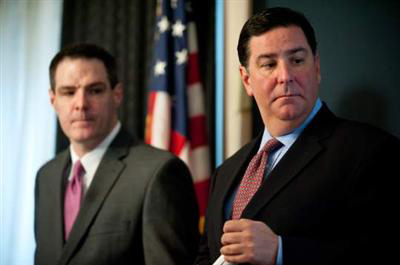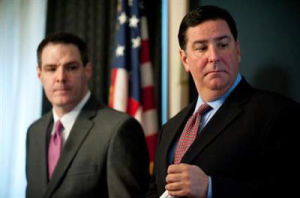

By Aaron Warnick | The Duquesne Duke
Pittsburgh Mayor Bill Peduto announced a $505.9 million budget for 2o15 that includes a property tax hike.
The budget is the start of a “new era of truth in budgeting,” Peduto said in a statement.
According to the projections, homeowners who have properties valued at least $100,000 will see a tax bill increase of approximately $40 per year, factoring in other exemptions.
According to the mayor, the five-year plan’s endgame is to see Pittsburgh out of the Act 47 program that mandates state-oversight for financially distressed municipalities. The mayor’s office blamed previous administrations for mishandling the budget.
Sam Ashbaugh, Pittsburgh’s director of the Office of Management and Budget, said previous budgets contained “fiscal illusions.”
One of these illusions, according to Antony Davies, associate professor of economics at Duquesne, would be inflating property assessment values while keeping millage rates low.
“The problem is when it comes to property tax is that there is way too much opportunity for bait and switch,” Davies said. “If you over-value a property during assessment, you are essentially raising taxes without saying that you are.”
During the 2012 county property reassessment, the Pittsburgh Post-Gazette launched an independent study that claimed the county reevaluation disproportionately raised the property values of homes in lower-income neighborhoods. The study found that some values were nearly four times their recent market sale price.
“There’s no perfect measure and you’re going to have problems for the last market price,” Davies said. “However, for example, if they cut my milage rate in half but at the same time more than double their evaluation of my property, then my taxes have gone up, despite what anybody says about numbers going up or down.”
However, state law prevents taxing bodies from collecting revenue windfalls after property reassessments.
The budget presentation provided by the mayor’s office claimed that avoiding the tax increase would have had to been offset by cutting key city infrastructure. The examples given were reducing the police force by 75 officers, closing five fire stations, eliminating City Planning and Animal Control or eliminating 20 percent of Public Works.
City Controller Michael Lamb opposed the new budget on Monday.
“Increasing the tax burden … is a step backward for Pittsburgh,” Lamb said in a statement.



